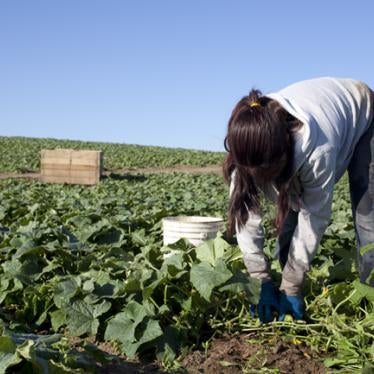Hilda Solis
Secretary of Labor
U.S. Department of Labor
200 Constitution Ave., NW
Washington, DC 20210
Re: Child Farmworkers
Dear Secretary Solis:
We are writing to express deep concern about the Department of Labor’s apparent failure to strengthen the enforcement of child labor laws in agriculture and to request a meeting with you to discuss how child farmworkers might be better protected by the department.
As you know, Human Rights Watch has documented that hundreds of thousands of children under age 18 work in US agriculture, many in conditions that are harmful to their health and safety. Children often work legally under federal law, due to a loophole in the Fair Labor Standards Act (FLSA) that allows children in agriculture to work at younger ages, for longer hours, and in more hazardous conditions than other working children. However, other children are working in violation of the law. Our May 2010 report Fields of Peril: Child Labor in US Agriculture found that the Wage and Hour Division’s enforcement of child labor laws in agriculture had been extremely weak, with a marked decline in violations cited from 2001 to 2009.
When you joined the department in 2009, you took several notable steps to enhance enforcement of US labor law. You increased the number of inspectors from 894 in 2009 to 1,035 in 2011. As our report was published, you wrote to Congressman George Miller and Senator Tom Harkin promising to dramatically increase enforcement efforts on behalf of child farmworkers. In June 2010 your department adopted a new framework to increase monetary penalties for employers who illegally employ children. And it has taken critical steps to strengthen the hazardous occupation orders for agriculture that should go a long way to protect children under age 16 from dangerous tasks. We welcomed these measures and the expressed commitment of the Wage and Hour Division.
However, enforcement data from 2010 show a disturbing overall decline in enforcement of the child labor law and, specifically, a slight decline in both the number of inspections in agriculture, as well as the number of child labor violations cited. According to data provided by the Wage and Hour Division, agricultural inspections dropped by 9 percent from 1,379 in 2009 to 1,259 in 2010. While the number of inspection hours in agriculture increased slightly—from 58,645 hours to 63,304 hours—the increase is less than the proportional increase in inspectors. Additionally, the average number of agriculture inspections and inspection hours per inspector declined. While the experience and training of new investigators might explain a temporary reduction in efficiency, this factor does not explain the overall decline in investigations.
In turn, child labor violations in agriculture decreased from 36 cases (involving 109 children) in 2009 to 31 cases (involving 49 children) in 2010. Similarly, overall civil monetary penalties assessed for child labor were almost halved from 2009 to 2010 ($4,031,564 to $2,120,472) (the Wage and Hour Division was unable to provide penalty amounts for agriculture). Nor has the use of the “hot goods” provisions increased, remaining at one case per year in agriculture.
According to the Wage and Hour Division, this decline results from more effective enforcement strategies, such as inspections during off-hours and on weekends in blueberries. While these strategies are important, this explanation is simply not supported, given the lack of any data to support this claim combined with the decline in agricultural inspections. Focusing on a single or just a few crops, such as blueberries, is not enough. We interviewed children who worked at age 11 and younger in onions, green peas, strawberries, cucumbers, cotton, and chilies.
Accordingly, we respectfully urge the Department of Labor to meet your commitment to increase enforcement efforts on behalf of child farmworkers by:
• Increasing the number of child labor investigations and enforcement hours in agriculture in line with the increase in inspectors;
• Ensuring that inspectors give priority to enforcing minimum age and hazardous occupation orders in all agricultural inspections and not just in a
few crops;
• Accelerating the training of new inspectors in FLSA’s child labor provisions and shift experienced inspectors to these investigations while new inspectors are being trained; and
• Imposing and actually collecting more substantial civil monetary penalties for illegal child labor within the limits of existing law, and increasing the strategic use of FLSA’s “hot goods” provision.
We have greatly appreciated the Wage and Hour Division’s willingness to engage with us and would welcome the opportunity to meet with you in person to discuss our concerns.
Sincerely,
Ken Roth
Executive Director







